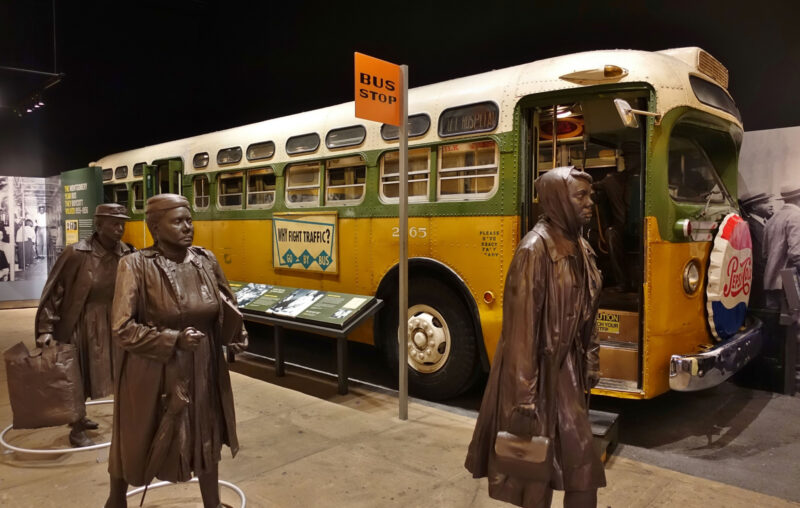[ad_1]

This week there might be numerous reflections on the unbelievable accomplishments of the American Civil Rights Motion. There might be celebrations of the monumental life and works of Dr. Martin Luther King, Jr. There might be reflections on the successes and shortcomings of the landmark Civil Rights Act of 1964 and the following Voting Rights Act of 1965. However there’ll inevitably be few essays extolling maybe a very powerful mechanism of the entire motion: the free market.
Whereas the milestone Supreme Courtroom circumstances of the Forties and Fifties, culminating with the Brown v. Board of Schooling ruling in 1954 had been foundational to the Civil Rights Motion, the grassroots organizing that will in the end outline the motion began at a bus cease in Montgomery, Alabama. On the night of December 1, 1955, Rosa Parks, a longtime NAACP activist who had labored to assist get authorized justice for victims of sexual violence, boarded a public bus within the downtown district of the Alabama capital. Inside just some blocks, Parks was instructed to surrender her seat for the excess of white riders that had boarded and to maneuver additional again on the bus. Parks refused. The bus driver referred to as the police. Parks was arrested. The next week, the black group in Montgomery launched a yearlong, extremely organized protest that will change American historical past ceaselessly.
On the coronary heart of the legendary Montgomery Bus Boycott was the transformative and liberating energy of the free market. In an effort to make public transit reasonably priced for the town, Montgomery had signed a contract with the Minnesota-based bus firm Nationwide Metropolis Traces. For the reason that flip of the 20th century, metropolis legal guidelines had required racial segregation in public areas, together with transit strains. The Montgomery Metropolis Line, in fact, needed to comply with public ordinances in an effort to function legally, however they nonetheless had an overarching mandate dictating their enterprise: the necessity to make a revenue. With the intention to maximize their profitability within the face of a strikingly inefficient (to not point out discriminatory) social system like segregation, the bus firm carried out a versatile seating protocol that accommodated the change in racial make-up of bus passengers from one cease to the following. The protocol employed a moveable signal to regulate the scale of the bus’s “whites solely” part. Beneath native regulation and customized, white riders had been preferenced over the consolation of black riders. The economics of constructing a revenue, nonetheless, required a a lot completely different actuality. Black riders’ ticket purchases had been important to creating the underside line for the bus firm.
Racist authorities laws might impose burdens on companies, however they didn’t alleviate the realities of the free market. Income required reserving house — even when it was a much less socially preferable house — for paying black prospects. This gave these riders shopping for energy and, in the end, political energy. The immutable legal guidelines of markets enabled Montgomery’s black group to make use of the withholding of bus fares by way of the organized boycott to successfully flip the town bus firm into an ally for authorized reform. As a result of the corporate wanted the {dollars} from black ticket purchases, that they had no selection however to stress the town to reform the regulation. There was not even a necessity for a right away change of coronary heart from the bus operators. It was a easy, irrefutable financial actuality. The brilliance of the Montgomery Bus Boycott was recognizing the unbelievable energy of black prospects within the face of such a demeaning system.
However the results of the free market didn’t finish there. Bringing the total power of their financial energy to bear on the transit system took a full 12 months. Success required a fairly huge and dependable various transit system to allow black employees the means to proceed attending to their jobs on time whereas withholding their bus fares. Right here too, the free market provided a workable answer. Although a technology earlier automobile possession had largely been the privilege of a predominantly white elite, automobile possession had expanded quickly within the postwar economic system, creating possible alternate options even for many who confronted common discrimination. The free market confirmed no desire for pores and skin shade. Black {dollars} might purchase simply the identical as white ones. This was immensely empowering for black Individuals. And the place authorities enforced options to segregation (an issue created by authorities seize within the first place), it solely took one 12 months for the free market to dismantle the racist transit system in Montgomery.
In order we honor the wonderful life and work of Dr. King and the various others who’ve fought for racial equality in the US, allow us to not neglect the simplest system devised for the elimination of inequality: the free market.
[ad_2]
Source link






